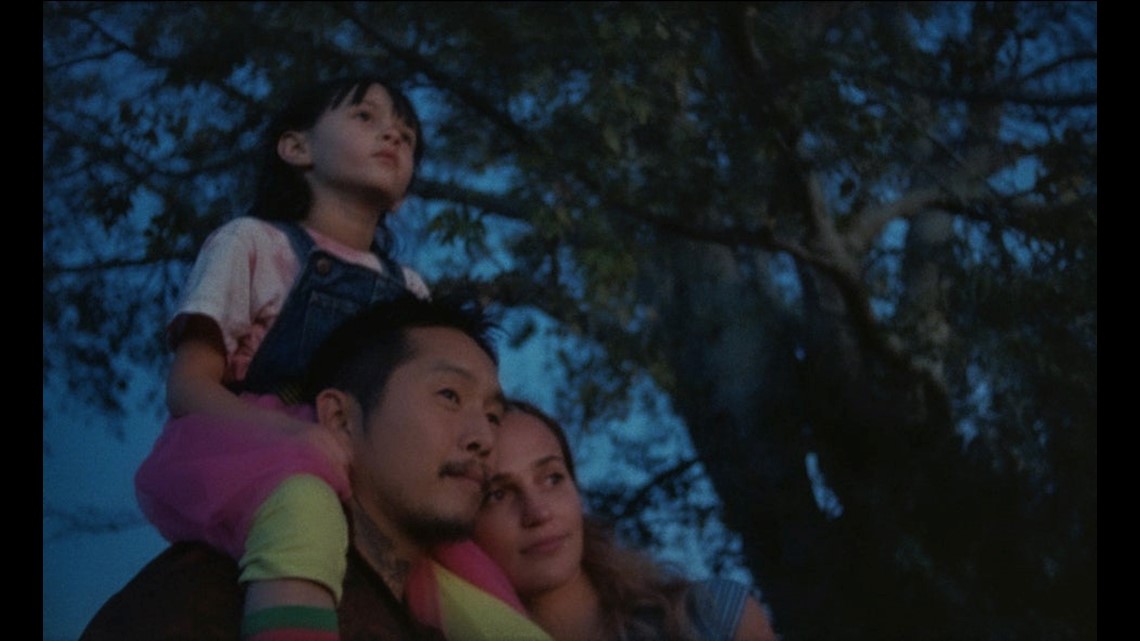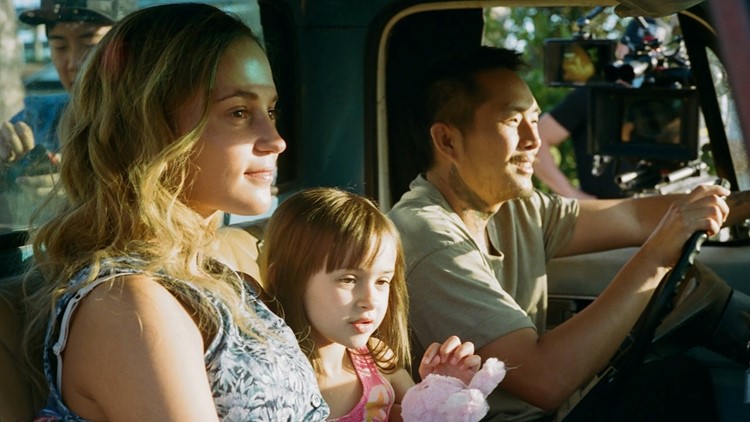Blue may be the titular hue, but Blue Bayou is a melodrama that lives in the black and whites of life, in the cut and dried institutions that would put a devoted family man, adopted and brought to the States as a small child, in danger of being deported from the only home he's ever known.
Writer-director Justin Chon stars as Antonio LeBlanc, a Korean adoptee raised in the Louisiana bayou, laboring to make a better life for his pregnant wife, Kathy (Alicia Vikander), and stepdaughter, Jessie (Sydney Kowalske). But when the sins of his past and an unjust police culture land him on the wrong side of ICE, Antonio's Americanness is called into question, no matter that he had no say in his coming here or that he is currently married to a citizen.
Blue Bayou takes its title from the Linda Ronstadt song of the same name, in which she croons, "I feel so bad I got a worried mind / I'm so lonesome all the time / Since I left my baby behind / On Blue Bayou." It's a film with a purpose, showing one man's fight to keep his family together in the face of a broken system, and which had its premiere on the international stage during this year's Cannes Film Festival.
Over Zoom, Chon and Vikander opened up to ET about the message of the movie, how becoming a mother has unlocked new expanses to Vikander's acting (she and husband Michael Fassbender recently welcomed their first child) and the power of karaoke.
ET: Justin, what was the first kernel of an idea that became Blue Bayou?
Justin Chon: I have quite a few adoptee friends, and about five years ago, I started hearing through the community that this issue was taking place, where adoptees who were brought here by U.S. citizens as children were now adults and facing deportation. I thought that was absolutely shocking, because you would think that if the government allows a child to be brought overseas, they would be automatically granted citizenship, no matter what paperwork that isn't filed. Because they had no sort of say in it.
And then on further research, I found out that once you get a deportation order, it's almost impossible to overturn it. It was happening a lot, and I just felt it was very unjust. I couldn't imagine what it feels like to be adopted and already have these sort of thoughts on identity and where you're from and then ultimately have the place you call home also say they don't want to claim you. It must be psychologically quite damaging. So, my heart bled for this community, and I really wanted to shine a light on this issue.
Did you write it always knowing that you wanted to star in it?
Chon: No, not at all. I didn't have any plan to act in it, but I did sit with it for four or five years and it just seeps into your bones. The other thing that I thought about was after the release of the film and it goes on digital, if this film has success or does anything [and] if it needs to be talked about, it is a lot to ask of an actor to continue to talk about the issues in the film and I know I could be responsible for that. Those things were important to me, and hence the reason I decided that I wanted to do it.
How did Alicia end up on your radar? And what was it about her that was right for Kathy?
Chon: Oh my god, do we need to say anything? She's incredible. I've been such a huge fan forever, and I really, truly feel that she elevated everyone's work, especially my own. Sometimes it takes two to tango, and you're in these scenes and it's hard enough as it is, like, just showing up on set, but when you have a partner like Alicia, I can literally just trust the work that I've done and be present in it and it happens.
Alicia Vikander: Yes, it takes two to tango. [Laughs]
Chon: Absolutely! Of course, I was so honored, and I also thought it was so interesting that someone from Sweden can take a very objective look at what it means playing an American character and make intentional choices. I thought that was an incredibly fascinating.
Well, Alicia, what was it about this character and this story that made you say yes? And what did you know or hope that you could bring to this?
Vikander: First, I am a huge admirer of Justin. I'm going to just send back some love to begin with. I saw Gook when it came out of Sundance a few years back and thought he did such an incredible job with that. Also, I remember I asked Justin during our first call and being aware of the difficulties that he's, of course, had to face being an Asian American actor and the terrible reality that, yeah, it was difficult to get work, even though he's already proven himself being an incredible actor. Justin is just a doer and one of the most hardworking people I've come across. He writes and he directs and he acts, and he knocks it out of the park and has already done three features. I'm the one who was just trying to keep up! [Laughs] I want to be able to match you, Justin, at some point. I loved working with him. It felt like it is when acting is the most fun.
I think I've wanted to play this kind of character, and most people have not given me the opportunity. Because I'm foreign or I'm Swedish, most people assume I have like a high-class background, because I did a lot of period dramas playing queens at the beginning of my career. And Justin had actually done the research and knew I was coming from maybe a more similar reality as this family growing up. I was surrounded by parents similar to Antonio and Kathy, hardworking people [who] care about family and want to create an environment that is beautiful for their children. That's something that I really admire. And then the actual issue that is at the heart of this film as well, I wasn't aware was a reality at all when I picked up the script. So, if I can give the same experience to people watching the film, I'm more than happy.
Justin, so much of this movie hinges on your character's relationship with Jessie. And Sydney is so wonderful. Talk to me about finding her and as her co-star and director, creating that dynamic that lives on the screen.
Chon: I mean, she's so special. And more importantly, she felt real. I think that casting a child is very difficult, because a lot of times their parents are very involved and they're very much coached and it feels like you're getting this product rather than a little girl. So, it took a second to find her, but I wanted to find somebody who is authentic and real. After I found her, I went to Atlanta and spent a few days with her family, and then we spent a considerable amount of time before the shoot. But it's not manufactured. People think it's some sort of like magic voodoo, but it just is, like, time. You spend time with somebody, you get to know them and it becomes much more intimate, and I think that translates to the screen.
Alicia, this was filmed before you were pregnant, right? You weren't pregnant filming this?
Vikander: No, this was before the pandemic. This was almost two years ago.
It's a very convincing belly in the sonogram scene. You play a mother. By no means can only mothers play mothers. But now that you've had that experience, has it changed the lens through which you look at these characters? Would you have played Kathy any differently today?
Vikander: My tools as an actor is my emotions and my experience. For every day, you build up that bank and you try and remember to use as much of it as you can. And you create and you fantasize about your characters. I can't say about Kathy, because I think having a child, it's that immediate thing. As a young woman, I've had friends, you've heard about all these things, but it's like this little key to a magic chapter in the book you suddenly get access to in a second. And you're like, "Oh yeah, I know everyone's told me this," but then you understand it on a very different level! So, I draw all my inspiration for Kathy through the women that I've had in my life and maybe profoundly my mother, because that is still the same relationship, even though I see it from the other perspective. But of course, moving forward, I'll have even more depth in my performances.


I want to talk about these accents. I feel like Southern, New Orleans accents are the easiest to slip into parody if done poorly. What sort of work did you put into finding the accent you would use in this?
Vikander: Well, especially being foreign, English is not my first language, that idea of Southern accents, I was afraid of it becoming-- I didn't want Kathy to become a caricature of a Southern belle. As soon as we knew we were going to make the film, I jumped on a plane to New Orleans. I got the chance to spend some time there before we actually started to shoot and was able to listen as much as I possibly could to people. I remember I was out, and I asked two people in a bar, "Where are you from? And where are you from? Because to me, you sound completely different." And I realized how many different accents exist within that city. It's so vast. So within that, I started to pin down, I was like, "Well, I want her to of course have a Louisiana accent, but I want to find something that is not overpowering the performance and the character itself." But yeah, I was nervous, because Justin came with already the perfect accent.
Chon: No, no! That's because I'm still so bad accents. It takes me so long, that I had to just pound it and pound it and pound it and work on it so hard to get it authentic. It's incredible, I feel like Alicia can turn it on and off. I cannot. I'm not as skilled, so I just had to live in it. But it's like Alicia said, it's really vast and diverse in all the different kinds of accents that exist in Louisiana and New Orleans. It's just about what specific person you're modeling it after and what is your socioeconomic status-- There's so many things involved. I definitely tried to make it specific. But you're right. It can come off, if done poorly, very sort of stereotypical and comical.
And Alicia, you not only have to speak in the accent, you sing. [In one scene, she's asked to perform an impromptu rendition of Ronstadt's "Blue Bayou."]
Vikander: Actually, that's sometimes easier. If you imagine like foreign singers, when you listen to them sing, you very often can't hear that they're foreign. And then you see them in an interview and you're like, "Oh! That's a very heavy accent!" Or maybe their English is not that good. So, actually sometimes the singing helps, because you find vowels easier in your mouth by singing. I've even done accents when my dialect coach forces me to sing lines, because it actually makes my brain kind of connect better with finding whatever vowels you're using.
You are a wonderful singer. If you want to record an album, I'll buy it.
Vikander: [Laughs] I loved it, but it was nerve-racking. It's a beautiful song. It's just not very easy. I even forced Justin to [sing it] to prove my point. I met him in Hawaii where he was editing the film and I was there by chance too, and we went to a karaoke and I made him sing it.
Chon: It's a very hard song! [Laughs] It's a very tough ask that I asked her to do.
Vikander: But I loved it! Because I told him and then you, like, quit halfway through and just turned and said, "OK, it's very difficult." And I was like, yes!
Chon: It is very difficult!
Blue Bayou is in theaters on Sept. 17.
RELATED CONTENT:



